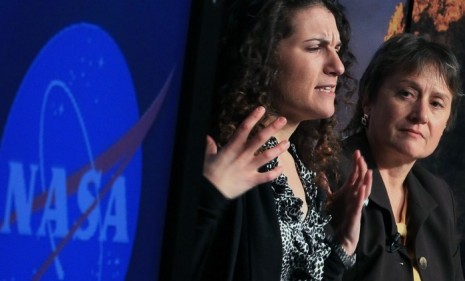Was NASA's big announcement a big mistake?
Last week's much-heralded discovery of a new form of life is already being dismissed by independent scientists who call NASA's research "sloppy"

A free daily email with the biggest news stories of the day – and the best features from TheWeek.com
You are now subscribed
Your newsletter sign-up was successful
With great fanfare, NASA announced last week that it had discovered a new form of microbial life that can live on arsenic in a lake in California. Even if the discovery left some underwhelmed, it was generally greeted as a breakthrough, a paradigm shift in how we should think about life itself. That is, until critical scientists began poking holes in NASA's research. (Watch a report about the accusations.) Here, a guide to the amazing discovery that might be anything but:
So, what did NASA discover again?
Last week, NASA announced the discovery of a new type of microbe, one that used arsenic — and not, like every other living thing on earth, phosphorous — to build its biological make-up. This discovery, NASA claimed, would change everything scientists thought they knew about the creation of life and broaden our ability to look for life in outer space.
The Week
Escape your echo chamber. Get the facts behind the news, plus analysis from multiple perspectives.

Sign up for The Week's Free Newsletters
From our morning news briefing to a weekly Good News Newsletter, get the best of The Week delivered directly to your inbox.
From our morning news briefing to a weekly Good News Newsletter, get the best of The Week delivered directly to your inbox.
Who doubts the veracity of their claims?
A dozen experts Slate's Carl Zimmer contacted "almost unanimously" agreed that NASA did not have a case to make. One skeptic was Canadian microbiologist Rosie Redfield, who blogged that NASA's evidence was mostly "flim-flam" with "very little reliable information" — unsuitable even for a PhD presentation. She added: "I don't know whether the authors are just bad scientists or whether they're unscrupulously pushing NASA's 'There's life in outer space!' agenda."
Where did NASA go wrong?
Scientists accuse NASA of failing to "clean" the microbe's DNA well enough to avoid misleading results. This theory suggests that NASA's researchers may have just found arsenic stuck to the outside of the microbe's DNA, instead of arsenic integral to that DNA. Others say that the organism could have survived on phosphates contained in contaminants in the lab. "This wasn't an attempt to fake it," sums up Alex Pasternack at Motherboard, "just the result of sloppy lab work." Harvard's Dr. Alexander S. Bradley, among others, is taking a more detailed look at the flaws in NASA's research.
A free daily email with the biggest news stories of the day – and the best features from TheWeek.com
How has NASA responded?
Ron Oremland, one of the original study's co-authors, said on Tuesday that such criticism is simply part of the scientific process. "Science works in a certain way. It's resistant to change," he said. "But if you look qualitatively at our data, it's compelling." He challenged his critics to disprove the findings: "They may prove us wrong, or they may reproduce the results and find new stuff... It's the way the process works."
Sources: Slate, LiveScience, Science Blogs, Motherboard, Discover